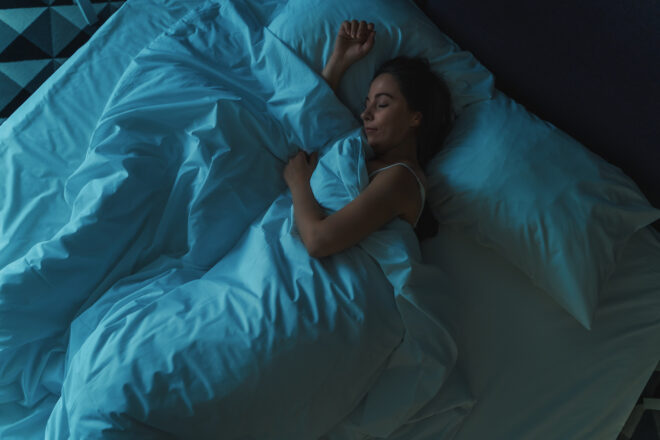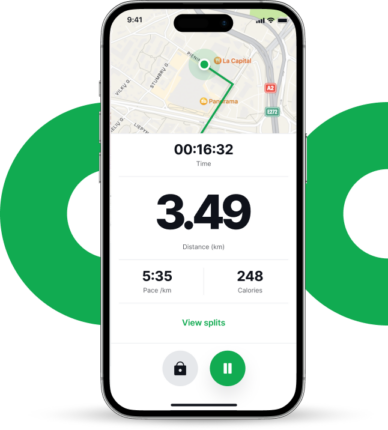Quality sleep is necessary for not only achieving your peak running performance but also for you to function well throughout your day. Ever notice how on the days where you didn’t get a night of good sleep, you’re just not quite “on”? You forget important things. You feel foggy.
Overall, the day seems like such a drag, all because you didn’t sleep well.
Surprisingly, athletes who experienced sleep deprivation felt exhausted 11% more quickly than their peers who had a great night’s sleep. Exercise, in general, also feels more challenging. It’s undeniable: sleep impacts your performance.
In this article, we’ll dive into what quality sleep means, how sleep impacts your running performance, and tips for better sleep.
In This Article:
What Does “Quality Sleep” Even Mean?
There are various factors that contribute to quality sleep. These include:
Sleep Timing
Generally, sleep experts can confirm that going to bed and waking up at the same time helps you get the sleep you need. Why? Because this supports your natural circadian rhythm. The circadian rhythm regulates your sleep-wake cycle. It follows a 24-hour clock, which often involves the rising and setting of the sun. When you go to bed and wake up at a regular time, you allow your body to fall into this natural rhythm.
Duration of Sleep
The average adult requires 7–9 hours of sleep per night. This allows your body to receive as much deep sleep and REM sleep that it requires to heal and repair. In fact, about 20 minutes after your fall asleep, your body releases the human growth hormone. This hormone is essential for the repair, maintenance, and healing of your body’s tissues. In a way, it’s the magic behind sleep. The human growth hormone helps you build muscle mass, increases metabolic function, and contributes to fat burn.
Your Environment
Your sleep environment matters more than you think! Ideally, you want to sleep in a cool, quiet, and dark environment. This promotes the release of the proper chemicals in your body that allow you to fall into a deep and peaceful sleep. When everything else fails, we recommend an eye mask and earplugs to help you get the rest your body needs.
Staying Asleep
Often, you wake up in the middle of the night due to stress. This is related, in part, to the release of stress hormones and blood sugar imbalance. While reducing stress in your life can help, so can consuming a bedtime snack. A bedtime snack supports your liver throughout the night, ensuring your blood sugar remains stable as you sleep. This prevents the release of the stress hormones until morning when you actually want to wake up.
How Sleep Impacts Your Running Performance
It does this in a few ways. As previously mentioned, insufficient sleep causes you to tire out quicker than you would with a good night’s sleep.
Interestingly, a lack of sleep can also interfere with the body’s ability to sweat. Sweating allows your body to maintain homeostasis – it cools you off. But if you’re sweating less, you won’t be able to cool off as quickly. This means you not only tire out faster but also feel hotter during your workout.
A bad sleep further interrupts the healing and repair processes that take place during this time. What does this mean? It means you might not make the gains you want, which means you might be more susceptible to injury.
Lastly, a night of poor sleep can weaken your immune system. If you’re more likely to get sick, this could mean your training for that next big race takes the sidelines while you take care of your health.
Tips to Sleep Better
So, you’re having issues with sleep, what can you do? Here are a few tips:
- Maintain a consistent sleep routine. Wake up and go to bed at the same time each day.
- Create an ideal sleep environment. Ensure your room is quiet, cool, and dark so that it isn’t a battle getting to sleep or staying asleep.
- Wind down before bed. Within the 1–2 hours before you go to bed, participate in a relaxing activity. This may mean taking a warm bath, reading, or doing a puzzle.
- Ensure you have a quality mattress, pillow, and sheets. Comfort is key!
- Grab a bedtime snack. Try milk with honey or even ice cream to help you ease into sleep.
Key Takeaways
Poor sleep can be detrimental to your running performance. And if you haven’t had a good sleep, it might be best to save your training for another day when you can truly give it your all. If sleep is an issue, look at the why. Start implementing the tips above to help you achieve the sleep your body desperately wants and needs.
- Poor sleep impacts your immune system, how quickly you tire out, and your ability to regulate your body’s temperature.
- Quality sleep can be achieved through proper sleep duration, maintaining a regular sleep schedule, and with an ideal sleep environment.
- Having trouble sleeping? Try going to bed and waking up at the same time. Create an ideal sleep environment. Wind down before bed, and/or grab a bedtime snack!














